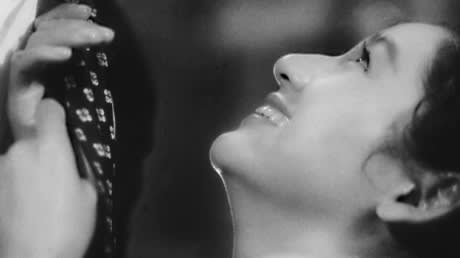Famed Japanese author Fumiko Hayashi's final unfinished novel Repast was the first of many adaptations of her works by director Mikio Naruse. Her depictions of free spirited women and oft-troubled relationships mixed well with Naruse's bleak depictions of working class life in Japan, challenging and deconstructing the roles of women in relation to an ever-fluctuating economy in a pre and post-war environment of industrialization and the abandonment of traditions.
In Repast, the quotidian experience of housewife Michiyo (Setsuko Hara) is set against the backdrop of post-WWII Japan. Forced to live in Osaka after her husband's low paying job is moved away from Tokyo, the excitement and reassurances of marriage have long worn off, just as the novelty of spending her days cleaning and cooking for a man she has little interest in has become stale.
Instigating conflict is Satoko (Yukiko Shimazaki), Hatsunosuke's (Ken Uehara) niece, who comes to stay with the couple presumably due to some familial conflicts and frustrations at home. Initially pleased by the change, her intrigue quickly turns to jealously when she sees how much her husband dotes on the girl and recognizes the world of possibilities ahead of the younger, single woman.
Though the structure of Naruse's quiet admonitory and subtle condemnation of social change is incredibly didactic, routinely bringing up the economy and spelling out the options and resultant limitations of women, his ability to capture unspoken jealousy and passive-aggressiveness is quite astounding. Michiyo's ambivalence about her marriage and resultant trip back to Tokyo to look for work and potentially seek out a divorce isn't handled with histrionics rather; she's quite calm about the situation, which is given depth by Hara's forced brave smile and haunted, melancholic eyes.
Similarly, her anger towards Satoko for stepping all over her life and ruining her plans for escape is kept beneath the surface, never to be verbalized.
Beyond this examination of a woman exploring her options only to gain some counter-feminist perspective on things are many socio-economic observations. The lack of men and money following the war has left women in a very unique position. It's a position where the search for a husband is one of the few roads to survival, saving low wage employment. And since there are far more women than there are men, this creates an environment of female competition, which is smartly handled through two-faced behaviour and veiled criticisms pushed through fake, condescending smiles.
This sharp assessment of culture in the midst of change is what gives Repast its lasting effect. Naruse managed to shed light on a time in Japanese culture from within it, giving some perspective and historical context to a country that has since grown exponentially. Even the steady handling of masked disappointment lends itself to discourse on the global history of women's rights.
Repast screens at the TIFF Bell Lightbox as part of the Japanese Divas retrospective at 4:45pm on Saturday, March 23rd, 2013.
(Toho Company)In Repast, the quotidian experience of housewife Michiyo (Setsuko Hara) is set against the backdrop of post-WWII Japan. Forced to live in Osaka after her husband's low paying job is moved away from Tokyo, the excitement and reassurances of marriage have long worn off, just as the novelty of spending her days cleaning and cooking for a man she has little interest in has become stale.
Instigating conflict is Satoko (Yukiko Shimazaki), Hatsunosuke's (Ken Uehara) niece, who comes to stay with the couple presumably due to some familial conflicts and frustrations at home. Initially pleased by the change, her intrigue quickly turns to jealously when she sees how much her husband dotes on the girl and recognizes the world of possibilities ahead of the younger, single woman.
Though the structure of Naruse's quiet admonitory and subtle condemnation of social change is incredibly didactic, routinely bringing up the economy and spelling out the options and resultant limitations of women, his ability to capture unspoken jealousy and passive-aggressiveness is quite astounding. Michiyo's ambivalence about her marriage and resultant trip back to Tokyo to look for work and potentially seek out a divorce isn't handled with histrionics rather; she's quite calm about the situation, which is given depth by Hara's forced brave smile and haunted, melancholic eyes.
Similarly, her anger towards Satoko for stepping all over her life and ruining her plans for escape is kept beneath the surface, never to be verbalized.
Beyond this examination of a woman exploring her options only to gain some counter-feminist perspective on things are many socio-economic observations. The lack of men and money following the war has left women in a very unique position. It's a position where the search for a husband is one of the few roads to survival, saving low wage employment. And since there are far more women than there are men, this creates an environment of female competition, which is smartly handled through two-faced behaviour and veiled criticisms pushed through fake, condescending smiles.
This sharp assessment of culture in the midst of change is what gives Repast its lasting effect. Naruse managed to shed light on a time in Japanese culture from within it, giving some perspective and historical context to a country that has since grown exponentially. Even the steady handling of masked disappointment lends itself to discourse on the global history of women's rights.
Repast screens at the TIFF Bell Lightbox as part of the Japanese Divas retrospective at 4:45pm on Saturday, March 23rd, 2013.
